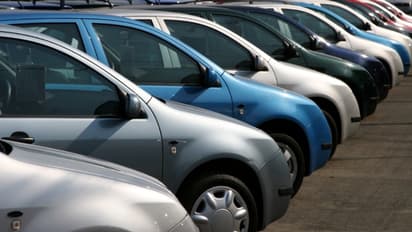Will car prices drop? Inventory buildup puts pressure on manufacturers

Synopsis
The Indian automobile industry is facing a crisis due to a decline in car sales, leading to a massive inventory buildup at dealerships. Despite this, companies are increasing production capacity, which may lead to a decrease in car prices.
The Indian automobile industry is facing a significant crisis due to a decline in car sales, leading to a massive inventory buildup at dealerships. Despite the growing stock of cars in the hands of dealers, companies are reportedly continuing to increase production capacity. While this has reduced the waiting period for many cars, there is speculation that car prices may decrease in the future. Experts in the field point out that this is a sign of a significant crisis.
Also Read: Auto manufacturers to offer discount for those scrapping old vehicles to buy new ones, says Gadkari
The Federation of Automobile Dealers Associations (FADA) expected a 3-4% increase in car sales but witnessed a 10% increase in production capacity instead. FADA CEO Saharsh Damani noted that the stock, which previously lasted for 30-32 days, now suffices for 67-72 days. The average car price has risen from Rs 6 lakh to Rs 10 lakh since the pandemic, while sales haven't increased proportionately.
Currently, approximately 7.25 lakh unsold cars are lying in around 15,000 dealerships, their warehouses, and 30,000 outlets across the country. If the average price of these cars is calculated at ₹10 lakh, it amounts to a stock worth ₹75,000 crore. Additionally, automobile companies continue to send new cars to dealerships every day.
Approximately 7.25 lakh unsold cars, worth ₹75,000 crore, are currently in dealerships, warehouses, and outlets across the country. FADA is preparing to approach financiers to stop over-lending to automobile dealers. FADA President Manish Raj Singhania had earlier told Business Line that manufacturers should immediately recalibrate and adjust their production for vehicles that are in demand from consumers.
Companies like Maruti, Hyundai, and others are offering discounts ranging from ₹60,000 to ₹2.5 lakh to encourage car purchases. Dealers are also reducing commissions, but there aren't enough consumers. Except for a few models, all cars are available without long waiting periods.
Used car sales have increased recently, especially in major cities like Delhi, Mumbai, and Chennai. India, the world's third-largest automobile market, recorded a decline in passenger car sales in July for the first time in two years, with sales dropping by 2.5% year-on-year, with 3,41,000 units sold across the country during the month.
Decline in Sales
The unsold cars led to a massive inventory buildup at dealerships, forcing car manufacturers to cut back on dispatches to their channels (considered as sales).
There could be several reasons for the decline in demand for vehicles. The slowdown in demand began around this year's Lok Sabha elections, while severe heat following heavy rains also affected car sales. The slump in the passenger vehicle segment in the Indian market has placed a heavy burden on dealerships. To counter this, automobile companies are not only cutting production but also moving towards offering discounts.
Most car companies, except Mahindra, Toyota, and Kia, recorded a decline in July 2024. Maruti Suzuki's sales dropped by 9.65%, while Hyundai, Tata Motors, and Honda also recorded declines. Tata Motors' electric vehicle sales saw a significant drop of 21% in July. The company sold a total of 5,027 electric cars in the domestic market in July, significantly lower than the 6,329 units sold in July last year.
According to a report by Business Standard, Maruti Suzuki India Limited, the country's largest car manufacturer, has slowed down production after a decline in sales, and production adjustments will be necessary to balance inventories.
Also Read: Rolls Royce to Bentley: New ICC president Jay Shah's car collection
Stay updated with all the latest Business News, including market trends, Share Market News, stock updates, taxation, IPOs, banking, finance, real estate, savings, and investments. Track daily Gold Price changes, updates on DA Hike, and the latest developments on the 8th Pay Commission. Get in-depth analysis, expert opinions, and real-time updates to make informed financial decisions. Download the Asianet News Official App from the Android Play Store and iPhone App Store to stay ahead in business.